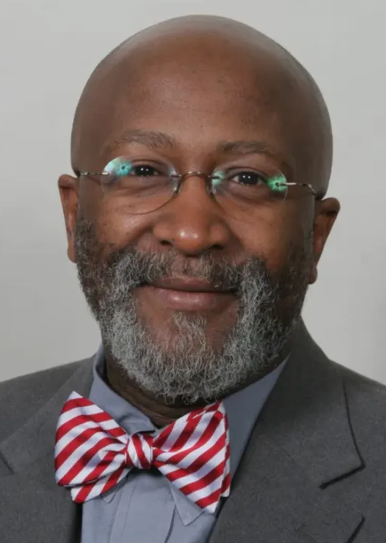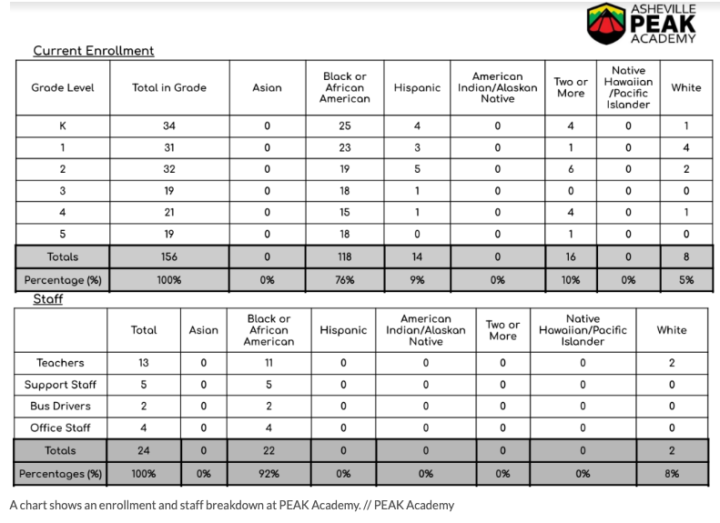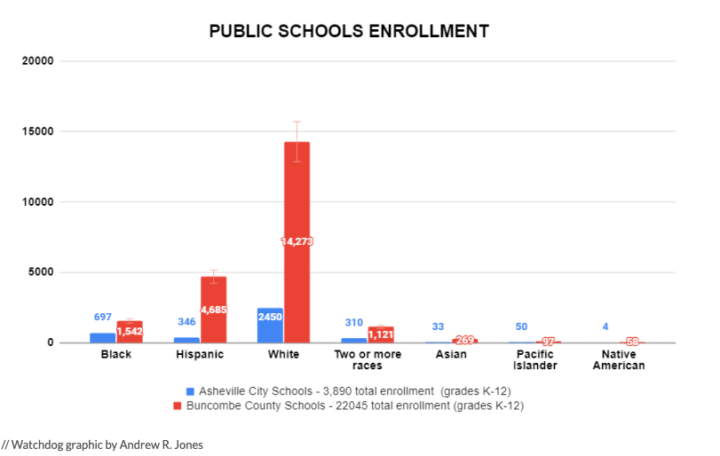by John Boyle, avlwatchdog.org
On the surface, it may seem like a legal annoyance, a nuisance case that might require an expensive response from an attorney then disappear.
But the federal civil rights complaint that WNC Citizens for Equality has filed against PEAK Academy alleging racial discrimination against white students and faculty could have serious ramifications for the charter school. Established three years ago to address the racial achievement gap in Asheville City Schools — consistently the highest in the state and among the highest in the country — PEAK has an overwhelmingly African American student body and faculty and makes no bones about its mission.
PEAK officials are adamant that all applicants for student and faculty positions are welcome, regardless of race, and that the school does not discriminate in any way.
Still, the school finds itself on the defensive legally, partly because one of its board members has said publicly the school’s student body and faculty will be at least 50% Black.
The school’s leaders maintain WNCCE’s action smacks of racism.
“I don’t know what they want to accomplish,” PEAK’s executive director, Kidada Wynn, said. “But this is something I personally feel: People have a hard time accepting that our scholars are people of color or children of color and are going to excel. I don’t know why, but it’s a hard pill to swallow for a lot of people, that our students, they’re excellent.”
WNCCE is led by former Asheville City Council member and congressional candidate Carl Mumpower and former City of Asheville risk management director John Miall, who are both white.
Mumpower said his group appreciates “informed criticism,” but, he said, “A more accurate description of our effort is that we are fighting for people in our community to be treated without consideration for their skin color.”
PEAK, which stands for Preparing, Empowering, Achieving through Knowledge, is already feeling the impact of the legal proceeding, which was filed Aug. 2 with the U.S. Department of Education’s Office of Civil Rights. And legal scholars say the school may have more exposure than it thinks, especially in the wake of last year’s U.S. Supreme Court ruling in Students for Fair Admissions v. Harvard University and UNC Chapel Hill, which essentially banned any consideration of race in college admissions.
The school already has narrowed the achievement gap, the difference in test scores between white students and those of color. For the 2022-23 year for end-of-third-grade tests, PEAK’s students earned a 72.2% proficiency rate in math and 44.9% in reading, according to the N.C. Department of Public Instruction.
Just 15.5% of Black third graders in Asheville City Schools showed proficiency in reading, compared with 75.6% of whites. The gap was even greater in math, with 13.8% of Black ACS third graders showing proficiency, compared with 80.1% of whites.
PEAK has boomed in a short time, growing this school year to 156 students from 82 last year. It offers classes from kindergarten through fifth grade and plans to expand to 400 students through the eighth grade in the 2027-28 school year, according to its charter.
“It eats away at our resources,” said Dwight Mullen, a PEAK founder and board member, and the person who made the “50%” remarks cited in the legal filing, referring to the complaint. “And that really does concern me, that this is a not-so-subtle way of bankrupting us. And for what end? I mean, to maintain the same outcomes that we’ve been dealing with for 30 years?”
PEAK board Chair Gene Bell said the legal action may hurt PEAK with some donors. It costs about $2.6 million annually to run PEAK, and as a charter school, it receives less funding per pupil than public schools, making donor contributions crucial.
WNCCE maintains that PEAK Academy is discriminating against white children and faculty.
“Both North Carolina law and federal law prohibit racial discrimination in public schools,” the group states on its website. “PEAK Academy, as a public charter school, must abide by these laws which prohibit schools from choosing teachers and students based on skin color.”
The school has a staff of 24, including 13 teachers, two of whom are white. The other 22 staffers are Black. Wynn stressed that PEAK does not have a quota for students or teachers of color.
“We interviewed several applicants not of color,” Wynn said. “They declined the offers, all but two. And we let some African American/Black candidates know that they were not a good fit for PEAK.”
Mumpower: ‘Stated dedication to racial quotas’ is the issue
None of that is relevant to the citizens group, which bills itself as nonpartisan. It says in the complaint that “PEAK’s leadership has stated that it has implemented policies that restrict student enrollment and staff employment on the basis of race or skin color in violation of federal law[.]”

Mumpower, president of WNCCE, requested Asheville Watchdog’s questions in writing and answered them via email. In explaining the group’s case, and in addressing allegations of racism, Mumpower invoked several civil rights icons.
“Ours is the same fight as MLK, Thurgood Marshall, Malcolm X and others who believed that Americans should be measured not by their skin color but by their character,” Mumpower said.
Mumpower said he and his group have no problem with PEAK’s charter, which the state approved.
“It’s PEAK’s leadership’s stated dedication to racial quotas that is at issue,” Mumpower said. “Racial quotas are not part of their charter.”
The citizens group specifically cites comments made on three occasions by Mullen, a PEAK founder and board member. In a December 2021 speech, Mullen talked about PEAK’s goal of eliminating disparities.
“We will do so by clearly addressing it through 50% of the staff and faculty, 50% of our student body, will be children of color and people of color,” he said. “There’s no mistake about why we are here and what we intend to do.”
Last February, Mullen addressed PEAK’s mission in a public appearance, stating, “We are chartered to be at least 50% children of color, 50% staff and faculty of color. We actually exceed that at 75%.”
And in May, addressing Asheville’s community reparations board, Mullen stated, “The charter for the PEAK academy was approved by the Department of Public Instruction, and we require 50% of our faculty and staff to be people of color.”
Mullen, a retired UNC Asheville political science professor, said he was not speaking on behalf of the PEAK board when he made his public comments.
“So these are really, I think, freedom-of-speech issues,” Mullen said.
Mullen said his comments about 50% of staff and the student body being people of color are based on the school’s approved charter, and on the level of disparities in the achievement gap, as the difference in results between white and Black children spans about 50 percentage points.
PEAK is “completely aligned with the application that was approved,” Mullen said.
Asked if PEAK had any quotas in place, Mullen said, “We did not. We certainly did not. We’re not exclusionary. We’re not saying, ‘White folk can’t come.’ That’s not it at all.”

The WNCCE complaint states that a “review of PEAK’s staff/faculty and student body suggests that PEAK may be discriminating against applicants,” noting that at the time of the filing, out of the total number of employees, six were white, two Hispanic and the remaining 16 Black. (The breakdown has since changed.) At the time of the legal filing, PEAK had enrolled eight white students, the complaint states, while the population of Buncombe County as a whole is 89.4% white.
Asheville City and Buncombe County schools are overwhelmingly white in their student bodies and staffing, as are several of the other charter schools in the county.
For the 2023-24 school year, PEAK Academy has 156 students enrolled, with 118 Black students, 14 Hispanics, eight whites, and 16 children of two races or more, according to the school’s most recent data.
ACS, with a total of 3,890 students, has 2,450 white students, 697 Black students, 346 Hispanics, 33 Asians, 50 Pacific Islanders, four Indian students and 310 of two races or more. That’s a 63% white and 18% Black student body.
Buncombe County Schools are even whiter, at 65%, or 14,273 out of 22,045 total students, according to DPI statistics. Blacks comprise 7% of the student body, Hispanics 21.2%.
The percentage of staffers and teachers is also largely white in the city and county public schools, according to DPI data. Of 321 ACS teachers in the 2022-23 school year, 288 were white, 21 were Black and 12 were listed as “other,” which translates to just 6.5% Black teachers and almost 90% white ones.
Buncombe County had just 15 Black teachers out of 1,568 total in the 2022-23 school year, or not quite 1%. The county had 101 teachers listed as “other,” and 1,452, or 92.6% as white.
The complaint states discrimination is “a direct violation of Title VI and the 14th Amendment, from which Title VI is derived.” Title VI states, “No person in the United States shall, on the ground of race, color or national origin, be excluded from participation in, be denied the benefits of, or be subjected to discrimination under any program or activity receiving federal financial assistance.”
The citizens group also cites the Students for Fair Admissions case, insisting PEAK employs a quota system.
Bell, the PEAK board chair, says the Supreme Court case simply “doesn’t match” with what PEAK has been doing.
“We are definitely reaching out to Black kids, but we have not to this date rejected any white kid that’s applied to get into the school — none,” Bell said. “That’s the key.
“The truth is white people aren’t beating down the door to bring their kids over with a bunch of Black kids,” Bell continued. “That’s just the reality of it.”
PEAK’s goal to reduce the achievement gap may be “commendable,” the citizens group argues, but “a school cannot accomplish this goal by excluding students and teachers based on race.”
“Unfortunately, PEAK leadership has repeatedly and publicly shared their intentional application of racial quotas in student and faculty selection,” Mumpower said. “A quick glance at their enrollment report to the state on the racial makeup of the students and faculty at PEAK regrettably demonstrates an unfortunate mismatch between this organization’s words and actions.”
What PEAK’s charter says
PEAK’s charter, approved by the state, says the school will have the following anticipated demographic breakdown:
- Black – 45%
Hispanic – 20%
White – 30%
Native American/Asian/Pacific Islander – 5%
Percentage of economically disadvantaged students – 60%
Percentage of students with disabilities – 12%
Percentage of English language learners – 15%
While PEAK said in its charter application that it will not discriminate based on race or ethnicity, and “all students are welcome to apply for our lottery,” it also stated:
“We will market to and recruit students from predominantly lower-income, minority neighborhoods and will recruit and retain staff and board members that are reflective of the student population. While we anticipate PEAK Academy’s demographic composition will differ from that of Asheville City and Buncombe County Schools’ majority white population, it is essential that we enroll higher numbers of lower-income and students of color, because those are the students that need PEAK Academy the most.”
WNCCE cites that passage in its complaint. 
Asked about the status of the group’s case, Mumpower said it “could be a drawn-out process.”
Ashley Baquero, director of the N.C. Department of Instruction’s Division of Standards, Accountability and Research in the Office of Charter Schools, said the department is aware of the complaint but has no concerns about discrimination of any kind at the school. DPI has not received any similar complaints about PEAK.
Baquero also said DPI has no concerns about PEAK’s mission or its charter, and it has “no reason to believe it needs to be rewritten,” noting the charter was recommended by the former Charter Schools Advisory Board and approved by the state Board of Education.
A spokesperson for the U.S. Department of Education’s Office of Civil Rights said requests for information on cases have to go through the Freedom of Information Act process.
On its website, the Office of Civil Rights outlines the process for handling complaints, noting that it first “evaluates the written information that it receives to determine whether it constitutes a complaint that is subject to further processing. If so, OCR determines whether it can investigate the complaint.”
Legal scholars weigh in
Legal scholars say PEAK may need to worry, especially in light of the Supreme Court’s conservative makeup and the court’s Students for Fair Admissions decision.
Shannon Gilreath, a Wake Forest University School of Law professor, teaches constitutional law.The Students for Fair Admissions case decision was based on Title VI of the Civil Rights Act of 1964 in the Harvard case and the equal protection clause of the 14th Amendment in the UNC case, he said.
“What the court said is, ‘We require, now, colorblindness — that’s the constitutional rule with respect to the 14th amendment and Title VI in higher education admissions,” Gilreath said. “So strictly speaking, that case is limited to the higher education context.
“But this is a case, also, that signaled a real hostility by the majority of the court to race cognizance in any area,” Gilreath continued. “And as a consequence of that, I think there’ll be more cases testing the use of race in other areas, and the court will side on the rule of colorblindness in those areas as well.” 
The PEAK case has some “red flags,” Gilreath said, particularly because of Mullen’s comments.
Osamudia James, a UNC Chapel Hill School of Law professor, has expertise in civil rights and discrimination, education law, and race and the law. She initially suggested PEAK has little to worry about from the citizens’ group filing.
“Unless they can find explicit commitments to only hiring Black faculty, to only accepting [Black] students, under our current jurisprudence, this claim should not go anywhere,” James said. “I use the word ‘current’ as a qualifier, because the jurisprudence on race is changing.”
Historically, the courts have limited the circumstances in which an institution can use race explicitly in admissions or other programs. One is remediation for previous wrongs, the other diversity.
But the Students for Fair Admissions case changed that.
“They [the Supreme Court] basically decided that diversity is no longer a compelling interest that justifies the use of race,” James said.
James said she sees no evidence of quotas at PEAK.
“What I see is potentially school enrollment that is a product of an applicant pool that might be skewed toward people of color because they’re attracted to the ethos of the mission and the support of the institution,” James said. “I don’t see anything that says it has to be 60 or 70% [minority].”
But James said Mullen’s comments may be problematic. She cited a District Court case in Virginia in which the court found that a school board member’s communications stating it was important for the school to reflect the community were deemed evidence of an attempt to discriminate against Asian Americans and whites. The decision was overturned by the 4th Circuit, “but I do expect that case to go up [higher],” James said.
Group has been successful twice before
WNCCE has had success in two recent legal filings, one concerning a scholarship program for minority students run by the Asheville City Schools Foundation and another case against the City of Asheville and its formation of a Human Relations Commission that WNCNE said set quotas for a formula of diverse board members. The schools foundation eliminated one specific scholarship program, and the city reconfigured the commission, appointing Miall, the WNCCE vice president, to it after previously denying him a spot.
The city established the commission in 2018, and its “original membership makeup was composed of specific numbers of individuals with certain characteristics,” City Attorney Brad Branham said via email. “This was changed in 2022 to remove the numerical requirement of any particular membership category.”
More recently, Branham said, the city altered the language around how membership for the commission is selected. The Students for Fair Admissions case played a role, Branham added, as the city “believed it to be prudent to review the language in the city’s HRCA ordinance to ensure compliance with these newest court opinions.”
In the scholarship case, Copland Rudolph, executive director of the Asheville City Schools Foundation, said the foundation settled out of court with WNCCE in January 2022. The city had asked the foundation to administer the scholarship, which was intended to go to a Black student who planned to go into education — a small way to make up for generations of systemic discrimination in Asheville that included redlining and Jim Crow laws, Rudolph said.
The foundation had awarded its first scholarship along these lines in 2021, but the lawsuit came shortly afterward, followed by a quick settlement.
“And part of what we agreed to do is to not name race in the awarding of the scholarship, but to name those impacted by gentrification, urban renewal,” Rudolph said.
The foundation still awards about 40 scholarships, Rudolph said. They typically go to lower-income families.
The WNCCE lawsuit, Rudolph says, “was a performative lawsuit with the intention of a chilling effect on funding race-based programs, race-based scholarships.”
Allegations, denials of racism
Asked what she thought the citizens group was trying to accomplish in a big-picture sense, Wynn, the school director, said with a laugh, “I’m not white — I don’t know what the problem is.”
The legal action against PEAK clearly is a form of racism, Mullen said.
“I have a hard time seeing the difference between when the overt racists were out in front of the school buses saying, ‘Kids can’t come,’ and ‘You need to go back to where you come from,’ and the outcomes of what’s going on now,” Mullen said.
Miall, vice president of WNCCE, said the allegations of racism are “disappointing at best.” Miall noted his career in public service, including 12 years in human resources for the city, where he says every move was scrutinized to ensure there was no racism and full compliance with federal law.
“I find it frustrating that people would openly speak of race-based education and when questioned about it claim ‘racism’ in response,” Miall said via email. “There is nothing overtly ‘racist’ about complying with the law.”
Rudolph said WNCCE, and other groups like it, will continue to mount legal challenges, and that means schools, foundations, and other groups trying to help minorities have to be wary.
“All these organizations are lawyered up right now,” she said.
[Correction: An earlier version of this story misstated how much it costs to run PEAK Academy. Annual costs total $2.6 million.]
Asheville Watchdog is a nonprofit news team producing stories that matter to Asheville and Buncombe County. John Boyle has been covering Asheville and surrounding communities since the 20th century. You can reach him at 828-337-0941, or via email at jboyle@avlwatchdog.org. To show your support for this vital public service go to avlwatchdog.org/donate.



Let’s get real here ..Mumpower -along with his ardent MAGA followers- are flat out white supremacists. Always have been and always will be. Everyone knows this. Too bad our Supreme Court -led by Clarence Thomas, lol- has made clear that they’re on board with this in regard to Mumpower’s spurious but without any merit claim that PEAK is adhering to some clearly non-existent -in their charter and in their hiring and admissions policy- racial quotas. But, well, you know… they used to hide behind white sheets… now it’s just disingenuous as it gets dog whistle rhetoric from Mr. Mumpower per usual.
I agree wholeheartedly…this PEAK school is really on to something.
Plessy v. Ferguson worked just fine and beneficial to the peace and happiness of all. You are correct, ma’am, desegregation has been an utter failure and has been of no benefit to any racial groups in America. Bring back separate-but-equal and lets all just move on with our lives.
To deny free people the right to associate with members of their own tribe is not only hateful, but denies the very essence of biological evolutionary human behavior is destined to fail.
History and evolution teaches us — Diversity + Proximity = War
Every. Single. Time.
PS–don’t forget your Covid boosters! Safe AND Effective!
Name-calling is unkind, unnecessary, and not cvil discourse.
How does Copland Rudolph and her ACSF liberals get to DECIDE WHO is impacted by GENTRIFICATION and urban renewal ? ? ? WHO decided this ? Is this adversity from diversity ?
Having a great deal of experience in the school district this is all about racism. The Black students, parents, and community that supports the same Black students have nothing but obstacles placed in their way. This is a pity. I have met the PEAK Board members, many of their staff and know the only thought is how do we help students …all students.
Peak Academy is helping to erase educational achievement disparities. Bravo to Peak Academy, its teachers, staff and board. Mumpower and the other dude should take up a constructive pastime. I hear pickleball is fun.
Have we come full circle, back to days of segregated schools? Why are black students not performing well in public schools? I don’t think this has always been the case in Asheville/Buncombe area. When my kids were in local public schools, I don’t recall this being an issue. My 2 cents is that a kid’s interest in school-education begins in the home. What’s next? Segregated neighborhoods?
The achievement gap has been an ongoing problem. PEAK Academy was started to address that problem and they are doing excellent work. If you are unaware of the achievement gap I am going to go out on a limb and assume you are white. I am sure it is not your intention to imply that families of color and minorities are bad parents. Unfortunately you have done just that when you say “interest in school-education begins in the home.” PEAK Academy is not segregated! If white children do not apply to the school that does not mean it is segregated!
The past history of discrimination is clear in the overall achievement gap between black and white students in Buncombe county, and Asheville city schools. It is this achievement gap that apparently sparked the creation of this charter school. I hope that the court will be able to see the context in which this charter school sits, and will find that this is necessary to address past discrimination. After all Asheville city schools are operating under a desegregation order that was recently entered (1990s if I understand correctly).
It sickens me to see that in this day and age that some are still working so hard to impede the progress of young students to better educate themselves and improve the possibility of a successful life and career. The comments that PEAK reaches out to the Black community but does not deny any student access speaks to the speciousness of this lawsuit. PEAK is doing great work … I suggest we leave it alone
If you have always believed that everyone should play by the same rules and be judged by the same standards,
that would have gotten you labeled a radical 50 years ago, a liberal 25 years ago and a racist today.
– Thomas Sowell
The aspiration that everyone should be treated equal is a just goal. It prioritizes meritocracy over entitlement. However, in the context of race and racism in the US, it ignores that black people have not been treated equally for generations. For generations, blacks have not enjoyed the benefits that whites have. Not just during slavery (1776-1865) but for all the years since when blacks were cheated and robbed of their labor and land. For the years that they were “red lined” out of neighborhoods, discriminated for lending and employment. And lest we all forget that even today, they are not treated equally when it comes to many things, not the least of which is how the police interact with them.
The lesson that Mumpower and Miall would like you to swallow is that none of that matters, it does not matter that blacks have no inherited wealth, or that their parents had and have to work long hours for low pay. No, for the entitled Mumpower and Miall today we are going to treat everyone the exact same. Well, that’s what was supposed to happen in 1865 and blacks are still waiting.
Check out the racist Carl Mumpower post on Facebook on December 29th that he’s since deleted -it’s on the Asheville Watchdog site where they have a screen shot of it ….damning, to put it mildly.
I am a retired A.C.S. Teacher and a parent of two A.H.S. graduates. For the record, I happen to be a white male. Unlike Carl Mumpower, I am not offended by Peak Academy! As a matter of fact, I applaud Peak Academy and the success that their are having.